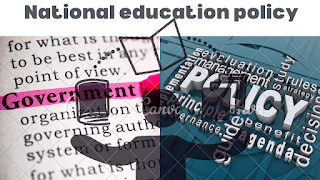National education policy
The National Education Policy (NEP) in India is a comprehensive framework that aims to transform the education system to meet the challenges of the 21st century. Envisioned as a roadmap for the future, the NEP was approved by the Union Cabinet in July 2020, marking a significant shift in the country's approach to education.
One of the key pillars of the NEP is the emphasis on early childhood care and education. Recognizing the importance of a strong foundation in the early years, the policy advocates for the integration of pre-primary education into the formal schooling system. This move aims to nurture creativity, critical thinking, and social skills from a young age.
In an effort to promote multilingualism and preserve linguistic diversity, the NEP encourages the use of mother tongue or local language as the medium of instruction until at least Grade 5. This shift aims to enhance students' understanding and retention of concepts, fostering a deeper connection with their cultural and linguistic roots.
The policy also underscores the need for a holistic and multidisciplinary approach to education. It encourages the integration of arts, sports, and vocational skills into the curriculum, acknowledging the importance of a well-rounded education that goes beyond traditional academic subjects. This approach is expected to nurture creativity, critical thinking, and problem-solving skills among students.
Another significant aspect of the NEP is the emphasis on technology-enabled learning. The policy recognizes the transformative potential of digital tools and aims to leverage technology for more accessible and inclusive education. This includes the use of online resources, digital content, and interactive learning platforms to enhance the overall learning experience.In terms of higher education, the NEP proposes a restructuring of the higher education system to align with global standards. It envisions the establishment of a single regulatory body for higher education, the Higher Education Commission of India (HECI), to replace existing regulatory bodies. This consolidation is aimed at reducing redundancy and promoting a more streamlined and efficient regulatory framework.
Furthermore, the NEP advocates for increased flexibility in higher education through the introduction of a multidisciplinary approach. Students will have the opportunity to choose courses across different disciplines, fostering a broader understanding of various subjects and encouraging innovation and interdisciplinary research.
The policy also recognizes the importance of research and innovation in driving economic and societal progress. It outlines initiatives to promote research culture in universities, establish a National Research Foundation (NRF), and create an ecosystem that encourages innovation and entrepreneurship.
While the NEP has received widespread acknowledgment for its ambitious goals and progressive vision, its successful implementation hinges on effective execution at various levels. Adequate infrastructure, teacher training, and sustained financial investment are crucial components for realizing the envisioned transformation in the education sector.
In conclusion, the National Education Policy is a bold and forward-looking initiative that seeks to revolutionize the education landscape in India. With its focus on holistic development, flexibility, and adaptability to the evolving needs of the 21st century, the NEP aims to equip the youth with the skills and knowledge necessary to thrive in a rapidly changing world. Its successful implementation holds the potential to reshape the future of education in India and contribute to the nation's socio-economic growth.










Comments
Post a Comment